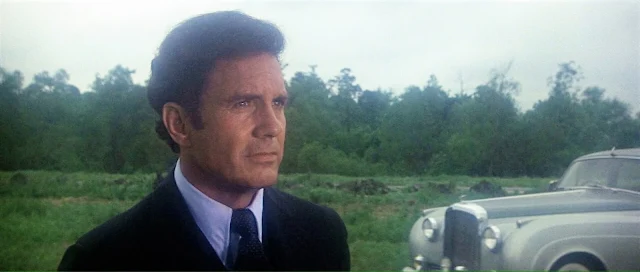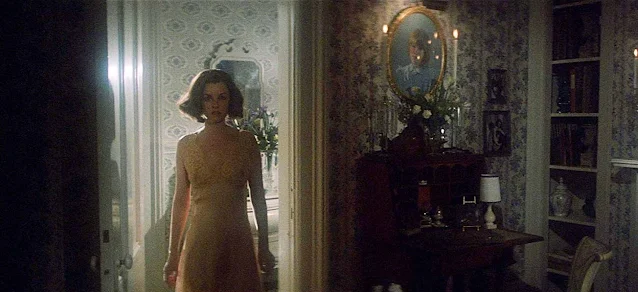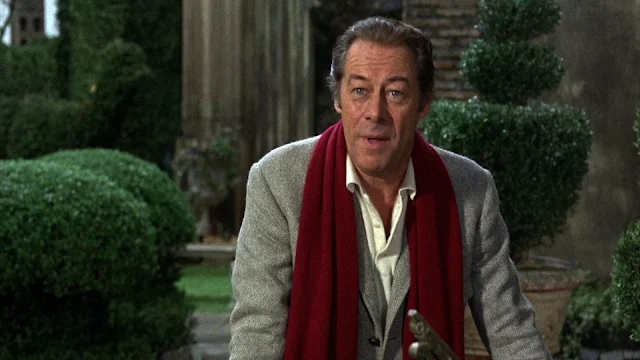 |
| Lorne Greene and Joan Crawford in Autumn Leaves |
Millicent Wetherby: Joan Crawford
Burt Hanson: Cliff Robertson
Virginia Hanson: Vera Miles
Mr. Hanson: Lorne Greene
Liz Eckhart: Ruth Donnelly
Dr. Malcolm Couzzens: Shepperd Strudwick
Director: Robert Aldrich
Screenplay: Jean Rouverol*, Hugo Butler*, Lewis Meltzer, Robert Blees
Cinematography: Charles Lang
Music: Hans J. Salter
Costume design: Jean Louis
Six years before
What Ever Happened to Baby Jane? Robert Aldrich directed Joan Crawford in
Autumn Leaves. I mention this because the image many people now have of Aldrich comes from Alfred Molina's portrayal of him in the TV series
Feud that this year concentrated on the shenanigans of Crawford and Bette Davis on the set of
Baby Jane. Molina's Aldrich is a punching bag for Jessica Lange's Crawford and Susan Sarandon's Davis, and a studio hack under the thumb of Stanley Tucci's snaky Jack Warner. In fact, Aldrich was a gifted director with some strong credits, including the noir version of Mickey Spillane's
Kiss Me Deadly (1955) and the action epic
The Dirty Dozen (1967).
Autumn Leaves shows off his strengths, especially in keeping a florid melodrama about Hollywood's idea of mental illness just this side of plausibility. He makes the most of the film's major set, Millicent Wetherby's bungalow, collaborating with cinematographer Charles Lang to keep an ordinary dwelling shadowy, confining, and off-kilter. Aldrich is particularly good at working with significant objects, and not only the typewriter that Burt Hanson so memorably hurls at Millicent. After a tense confrontation between Millicent and the increasingly unstable Burt, she goes from one room to another and there, front and center, Aldrich has placed precisely what we want to see: the telephone she should use to call for help. You sometimes sense that Aldrich is having a little fun with the film, too: He stages a beach makeout scene with Millicent and Burt kissing in the incoming tide that's an allusion to the celebrated scene with Deborah Kerr and Burt Lancaster in
From Here to Eternity (Fred Zinnemann, 1953). Aldrich is surely aware that Crawford was offered Kerr's role but turned it down. Crawford had just turned 50 and her face was beginning to harden into the familiar mask of her later years, but she's still plausibly a good five to 10 years younger as the tense, wary, but near-fatally susceptible Millicent. Cliff Robertson, especially in his early scenes, keeps us wondering whether Burt is more than just a creep who likes to hit on older women. Unfortunately, the portrayal of mental illness is the usual Hollywood hackwork: Millicent is in denial about Burt's psychosis because she is starved for love, having sacrificed herself in her youth so she could tend to her father, an invalid. Burt's compulsive lying is the result of a trauma suffered when he discovered that his wife was having an affair with his father. And of course, a montage of medication and shock therapy is all that's needed to persuade us that Burt has been rehabbed and is ready to resume something like a normal relationship with a wife old enough to be his mother. If I were Millicent, I'd keep the typewriter locked up when not in use.
*Jean Rouverol and Hugo Butler were blacklisted. The screen credit went to their "front," Jack Jevne.
Watched on Turner Classic Movies



















